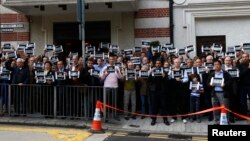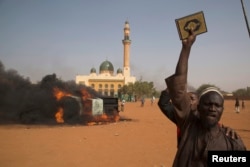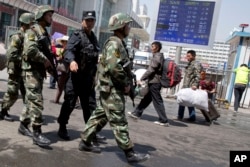The attacks on the French satirical magazine Charlie Hebdo have inspired mass demonstrations in support of free speech around the world, as well as smaller rallies condemning the cartoons that some Muslims find blasphemous. In Communist China, where the officially atheist government imposes heavy restrictions on speech, the demonstrations have led to a different reaction.
Charlie Hebdo has now printed more than seven million copies of its first edition since gunmen killed eight members of the editorial staff. The massive print run reflects the outpouring of support from many who see buying a copy as a rejection of the deadly plot to silence the magazine.
But among some Muslims, there is renewed outrage over the magazine’s cover that again features a cartoon of the Prophet Muhammad, which some consider to be blasphemous.
This simmering divide over free speech has also reached China, where the government keeps tight control over all publications and the Internet.
Government position
For Chinese authorities, the Paris attacks proved the dangers of an unrestrained press. The Xinhua news agency published an editorial concluding, “there should be limits to free speech.”
“If people would put limits on themselves when venting ‘freedom,’ and respect others,” Xinhua continued, “there would be fewer tragedies in the world.”
While it is expected that China’s state-controlled media would not champion the inherent value of free speech, William Nee, a China researcher at Amnesty International, says the response also echoes Beijing’s views on national sovereignty.
“As they put it, the world is diversified and every religion and culture has its own core values. So I think that what they want to do is solidify this idea that different countries and civilizations have their own core values that other countries need to respect,” he said.
China has long rejected foreign criticism of its tight restrictions of political freedoms, saying that other countries have no business dictating how it governs its citizens.
Right to restrict speech
Nee says the Charlie Hebdo incident has highlighted how China also believes that other nations have the right to restrict speech as they see fit.
He says Beijing draws parallels between its rejection of foreign criticism and the angry response from Muslims who see the Charlie Hebdo cartoons as deeply offensive.
“So in this case it may be that the Western press needs to respect that maybe other people find it offensive to depict the prophet Muhammad, but at the same time they need to respect the CCP’s [Chinese Communist Party’s] own core values and all of the things that potentially entails,” he said.
An editorial titled “Free Speech Mania May Intensify Clashes” in the state-backed Global Times newspaper similarly criticized the West for its commitment to free speech.
“What's advised now," says the editorial, "is that French society needs to restrain itself from portraying the Prophet and prevent a pursuit of free expression from turning into a religion.” The editorial warned of more violence and conflict in Europe fueled by unrestrained freedoms of speech and the press.
A different reaction
Xiaohe Cheng, a professor of international relations at Renmin University, says Chinese views on freedom of speech are heavily influenced by the Chinese political and educational systems that do not emphasize the history of civil society in other countries. Cheng says that is why reaction to the Paris attacks is so different in China from the rest of the world.
“Chinese people need to understand the political cultures in Paris, where people enjoy a high degree of freedom including the freedom of expression. I think a number of Chinese people have no idea the specific political cultures in France. France is the place where the revolution took place in which people championed the freedom of human rights, and I think Chinese people should really understand that,” said Xiaohe Cheng.
Gauging reaction among Chinese citizens is difficult given government censorship, but some commentators online expressed support for free speech in the wake of attacks. Others questioned why they cannot march in solidarity like the million people in Paris last week, since Beijing bans such gatherings.
China also has experienced terrorist attacks in recent years by groups that authorities say are Islamic extremists fighting against the state. Last year a gang of masked men and women that the government called “Muslim terrorists” stabbed 30 people to death at a train station in Yunnan Province, in an attack that many called “China’s 9/11.”
Rachel Lu, a writer who studies China’s social media, says some online commentators have gradually turned against the outpouring of sympathy following the Paris attacks, asking why China’s terrorist incidents have not provoked a similar response.
“At the same time, China has suffered its own terrorist attacks and why didn’t the U.S. and Europe have the same kind of outpour of sympathy for the Chinese victims? Is there a double standard? Gradually as the story evolved, there was more and more reaction in the western news, this how the Chinese reaction evolved, along those lines,” said Lu.
Xinjiang region
Critics of China’s policies in its Muslim-majority Xinjiang region say the terrorist attacks there are likely more a reaction against hardline government policies than the type of global terrorist movements represented by groups like al-Qaida and the Islamic State.
China’s government claims hundreds of people from its Uighur ethnic minority in Xinjiang have attempted to join Islamic State fighters in Syria. Beijing's drive to prevent future attacks within China remains a primary focus - outweighing concerns over protecting speech or holding solidarity rallies against terrorism.
Yan Xuetong, a dean of International Relations at Tsinghua University, questions the utility of anti-terror marches like the one in Paris earlier this month.
Yan says gaining the public’s support does not have to mean a mass demonstration or rally. What is more useful, Yan says, is the willingness of the public to provide governments with information. The impact of a march like the one in Paris, Yan says, is short term, while the public providing information on potential terrorist attacks consistently to authorities will have long-term positive effects on society.
While China says Western freedoms set the stage for the attacks in Paris, Uighur activists say China’s restraints on freedom of speech and religions are what prompts them to protest or attempt to flee the country. Such comments highlight Beijing's own difficulties in communicating with its Muslim citizens at home.







